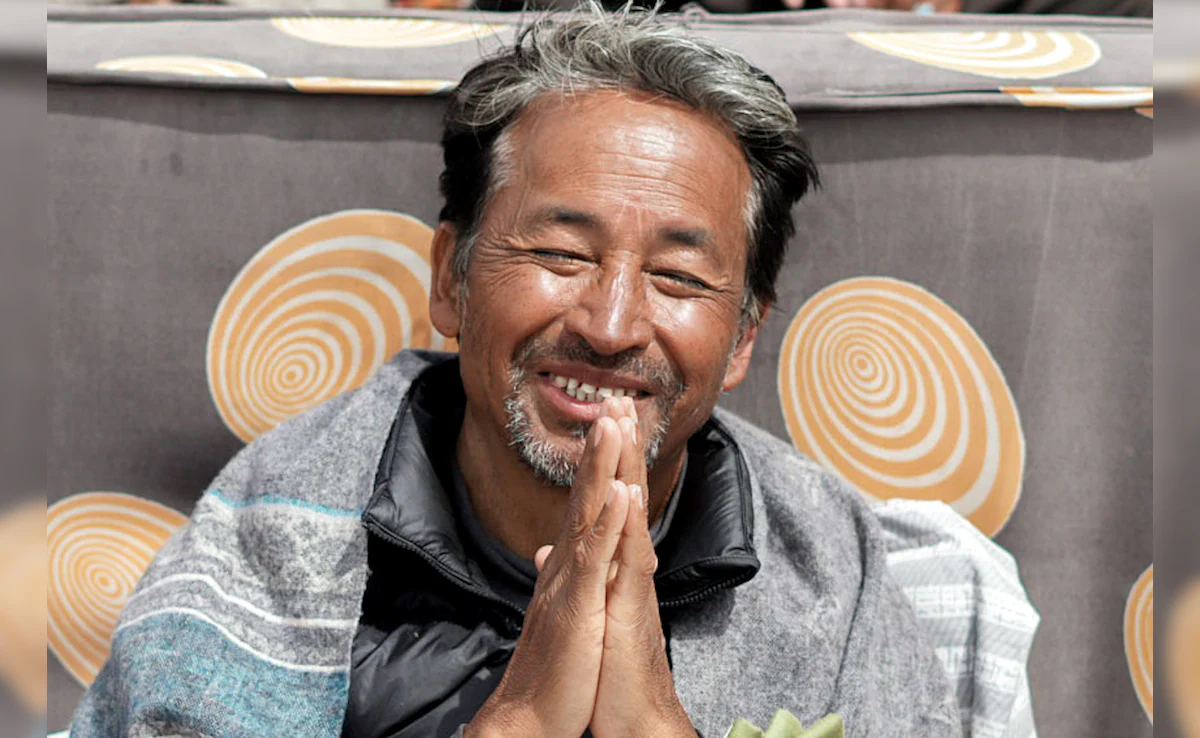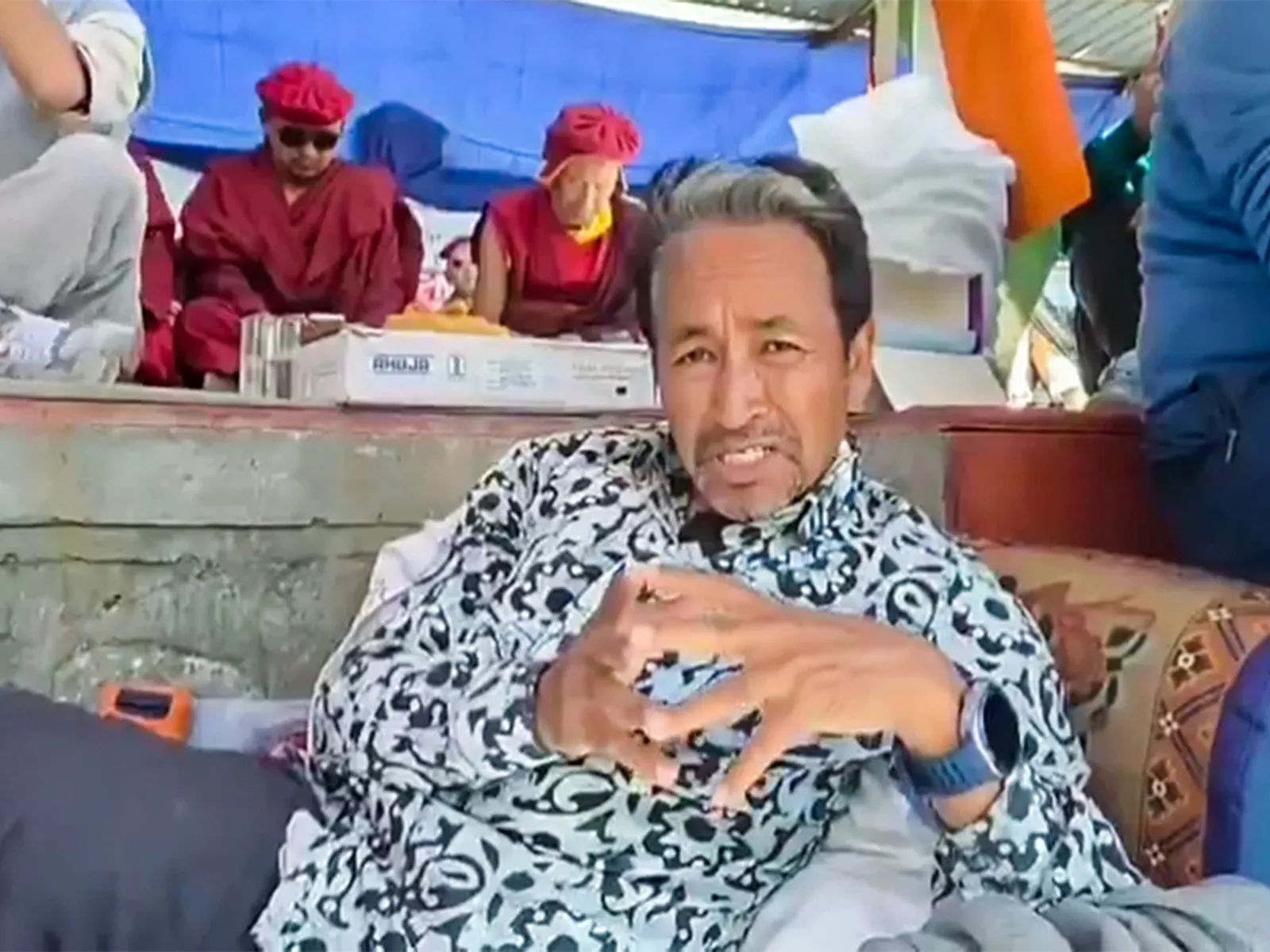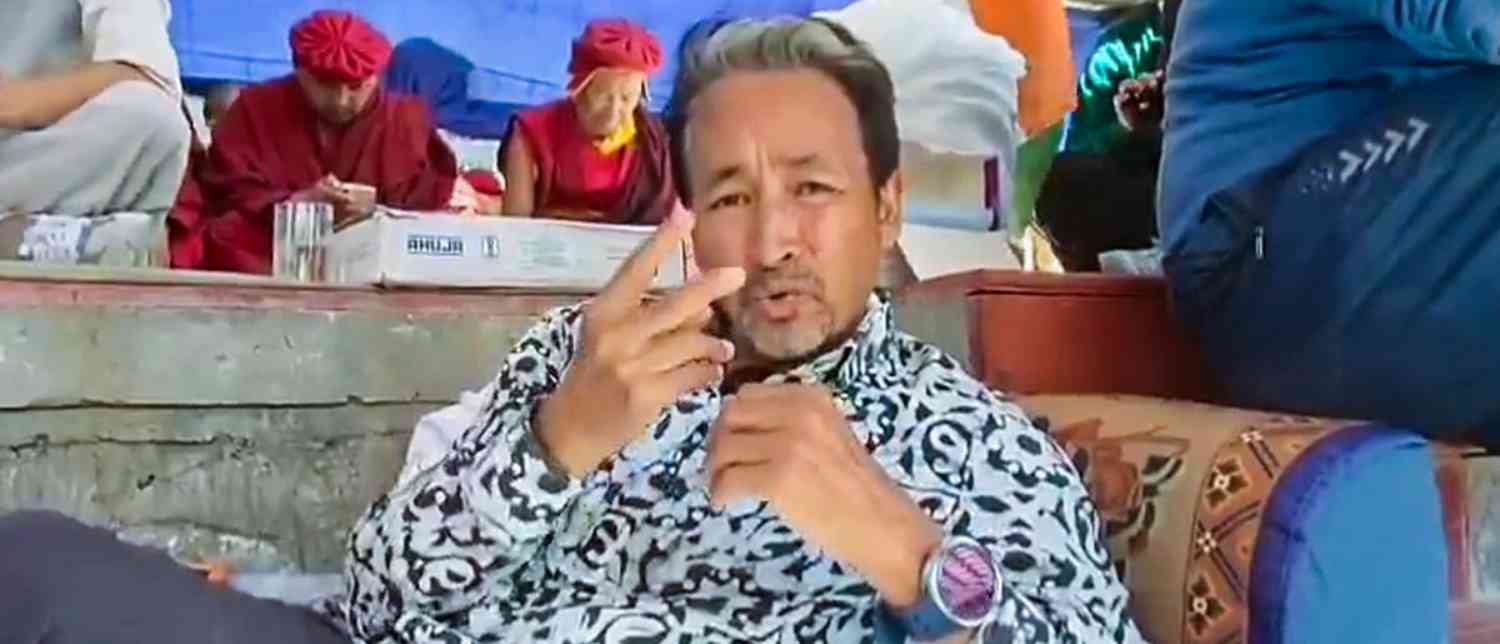In a move that has sparked nationwide political outrage and raised fresh debates about democracy, Ladakh’s prominent activist and education reformer Sonam Wangchuk was arrested under the stringent National Security Act (NSA). The arrest came just a day after Wangchuk himself had publicly said he would be “happy to be arrested anytime for this cause.”
According to government sources, Wangchuk was taken into custody for allegedly inciting a mob through “provocative statements” and has since been moved to an undisclosed location. The NSA under which he has been booked allows the authorities to hold an individual under preventive detention without bail for long durations. Sources have indicated that he may be shifted out of Ladakh either late Friday night or early Saturday morning.
Adding to the crackdown, the administration suspended mobile internet services in Leh immediately after Wangchuk’s arrest, citing fears of misinformation and unrest.

Arrest and FCRA Cancellation
Wangchuk’s arrest comes on the heels of another major action against him. The Ministry of Home Affairs (MHA) had earlier cancelled the registration of his non-profit, Students’ Educational and Cultural Movement of Ladakh (SECMOL), under the Foreign Contribution Regulation Act (FCRA), 2010. This stripped the organization of its ability to legally receive foreign funding.
Wangchuk, however, denied any wrongdoing, clarifying in an interview with NDTV that SECMOL had not taken foreign contributions but had instead conducted legitimate business transactions with international organizations such as the UN, Swiss, and Italian bodies, for which all taxes were duly paid.
He explained: “They mistook it as foreign contributions. I consider it a mistake on their [Centre’s] part and therefore I don’t mind it. But that’s what was thought of as a foreign contribution. It is not.”
The Protests and the Sixth Schedule Demand
Ladakh has been witnessing rising tensions since its separation from Jammu and Kashmir and the abrogation of Article 370 in 2019. While locals had initially welcomed the region becoming a Union Territory, discontent soon set in due to the absence of political representation and perceived neglect under the Lieutenant Governor’s administration.
This disillusionment brought together diverse groups—Buddhist-majority Leh and Muslim-majority Kargil—on a joint platform, demanding statehood for Ladakh and inclusion under the Sixth Schedule of the Constitution. The Sixth Schedule allows for autonomous governance in tribal areas, giving people more control over land, resources, and cultural preservation.
Wangchuk has been at the forefront of this movement, staging fasts and protests. However, violence erupted two days before his arrest during demonstrations in Leh, leaving four dead and over 50 people injured, including security personnel.
The MHA accused Wangchuk of inciting the mob. In its statement, the ministry said: “It is clear the mob was incited by Mr. Wangchuk through his provocative statements. Incidentally, amidst these violent developments, he broke his fast and left for his village in an ambulance without making serious efforts to control the situation.”
Wangchuk rejected these accusations, stating that he had always advocated peaceful protest and dialogue.
“Happy to Be Arrested for This Cause”
In an interview with NDTV the day before his arrest, Wangchuk appeared unflinching. He said: “I would be happy to be arrested anytime if it is for this cause. I am preparing for that. I am looking forward to it. I don’t want to be in any confusion.”
He also issued what many interpret as a warning: “Sonam Wangchuk in jail will be equally, if not more problematic, as Sonam Wangchuk outside participating in dialogues and discussions... because it will awaken people more about how this country is being run.”

Opposition Leaders React
The arrest triggered immediate political reactions across party lines.
Omar Abdullah, former J&K Chief Minister, called it “unfortunate”:
“It is unfortunate they have arrested him. BJP will never fulfil their promises. We are not justifying violence. Who am I to justify violence, but BJP should answer why they let such a situation develop.”
Speaking later in Srinagar, Abdullah accused the Centre of backtracking on commitments made to Ladakh:
“The way the Central government was after him since yesterday, it seemed they would do something like this. Promises were made with the people there… I don’t understand what compulsion does the Central government have to backtrack after making promises.”
Congress leader Ghulam Ahmad Mir said the arrest was unjustified:
“He never encouraged violence. The BJP government is hiding its failure after it could not handle the issues of Ladakh.”
Delhi’s former Chief Minister Arvind Kejriwal condemned the arrest as dictatorship:
“Raavan’s end also came. Kansa’s end also came. Hitler’s and Mussolini’s ends also came. And today, people hate all those individuals. Today in our country, dictatorship is at its peak. The end of those who practice dictatorship and arrogance is very bad.”
A Life Dedicated to Education and Climate
While the political storm rages, Wangchuk’s personal journey stands as testimony to resilience, innovation, and activism.
Born in 1966 in Alchi, Leh district, Sonam Wangchuk did not attend school until the age of nine because of the lack of schools in his remote village. His mother taught him the basics at home in their native language.
In 1975, when his father was elected to the Jammu and Kashmir government, the family moved to Srinagar. But Wangchuk’s early schooling there was traumatic—his classmates spoke in languages he couldn’t understand, and his silence was mistaken for a lack of intelligence. Unable to cope, he eventually ran away to Delhi in 1977, seeking admission in Vishesh Kendriya Vidyalaya.
Despite family disagreements—particularly with his father, who opposed his choice of engineering—Wangchuk persevered. He funded his own education and graduated with a BTech in Mechanical Engineering from NIT Srinagar (then REC Srinagar) in 1987.
In 1988, he founded SECMOL (Students’ Educational and Cultural Movement of Ladakh), a pioneering initiative to reform education in Ladakh. His work later extended into climate activism, including innovations such as artificial glaciers or “Ice Stupas” to address Ladakh’s water crisis.
In 2011, he pursued higher studies in Earthen Architecture at Craterre School of Architecture, Grenoble, France, before returning to serve on the Jammu and Kashmir State Board of School Education in 2013.
Wangchuk gained international recognition in 2018 when he was awarded the Ramon Magsaysay Award for his community-driven innovations. Earlier, in 2009, his life story had already inspired millions when Aamir Khan’s character Phunsukh Wangdu in 3 Idiots was based on him.
Why Ladakh’s Struggle Matters
The demand for statehood and inclusion in the Sixth Schedule stems from genuine concerns about land rights, environmental conservation, and cultural preservation. Ladakh’s fragile ecology, coupled with its unique ethnic and cultural identity, makes governance under a typical Union Territory administration insufficient, argue activists.
By bringing Buddhist and Muslim groups together under platforms like the Apex Body Leh (ABL) and Kargil Democratic Alliance (KDA), the movement reflects broad-based support. However, with the Centre emphasizing dialogue while simultaneously cracking down on protest leaders like Wangchuk, the standoff appears set to intensify.
The Road Ahead
As Ladakh braces for further uncertainty, the arrest of Sonam Wangchuk has become more than a local issue—it is now a symbol of dissent, democracy, and governance in India’s border regions.
For his supporters, Wangchuk is not just a reformer but the conscience of Ladakh, a man whose innovations and activism have always championed peaceful progress. For the government, his rising influence and ability to mobilize large crowds in a sensitive border region represent a challenge to law and order.
Yet, one fact remains undeniable: the arrest of Sonam Wangchuk has amplified the very movement the authorities sought to contain. As he himself warned, “Sonam Wangchuk in jail will be equally, if not more problematic...”
Whether Ladakh’s demand for statehood and constitutional safeguards gains momentum or faces further suppression, Wangchuk’s journey—from a struggling child in Leh to a globally recognized reformer and now a political prisoner—has already etched itself into India’s contemporary history.
With inputs from agencies
Image Source: Multiple agencies
© Copyright 2025. All Rights Reserved. Powered by Vygr Media.























